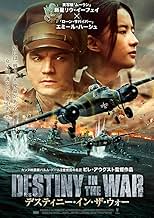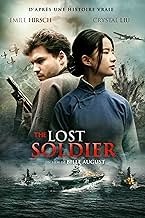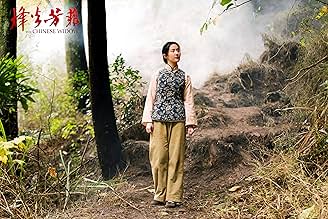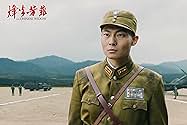VALUTAZIONE IMDb
6,3/10
1972
LA TUA VALUTAZIONE
Aggiungi una trama nella tua linguaAfter Japan's attack on Pearl Harbor Dec. 7, 1941, USA bombs Tokyo to boost morale. A pilot survives thanks to a Chinese woman's help.After Japan's attack on Pearl Harbor Dec. 7, 1941, USA bombs Tokyo to boost morale. A pilot survives thanks to a Chinese woman's help.After Japan's attack on Pearl Harbor Dec. 7, 1941, USA bombs Tokyo to boost morale. A pilot survives thanks to a Chinese woman's help.
- Premi
- 1 candidatura in totale
Gallen Lo
- Captain Hsu
- (as Gallen Law)
Lee Valmassy
- Ben
- (as Lee Douglas Valmassy)
Recensioni in evidenza
Some of the Chinese dialog didn't feel right, normal or correct for any Chinese speaking to each other, especially this film is about a bunch of villagers living in a remote mountainous area. No kid would say "Fu-Chin (father)" to his mother, but would say "Dad (Die)" or "BaBa", "Fu-Chin" is too literal and popular enough to be used in a mountain village in China. There are so many incorrect and wrong use of the Chinese language in this film's dialog. Those words used in this film simply felt more like highly educated people living in the big cities, these people in this film instead were living in a remote poor village in the mountain area, most of them would be illiterate since its around 1945. So every time, when the Chinese characters speaking, it's just not right but only bad screenplay writers would use such theater language that were not spoken by realistic Chinese people in their daily lives.
I often felt that most of the Chinese screenplay writers never could script correct and normal dialog speaking among the common Chinese people, every word just felt staged, like watching actors speaking on a theater stage. They cannot separate, distinguish, or truly grasp the realistic words according to the locations, the era, the time frames, the age differences, the education backgrounds, male or female gender differences....but just lazily and carelessly used the same format to write the scripts' dialog.
This is the main reason why most of the time I could only give lower ratings to most Chinese movies, because they just felt false and absolutely ridiculous.
This film was made, produced and released before the Japanese Prime Minister, Abe, revisited China a few days ago, and the Chinese Communist higher-ups suddenly changed their attitude to the Japanese government from hateful animosity to brotherhood love and friendship. If this film release date in China was scheduled when Prime Minister Abe's visiting date, then it would be definitely banned. Innocent Chinese villagers were viciously shot or chopping head off by the Japanese are now so unpopular and would be cunningly forbid or not recommended by the Chinese Communist government.
I often felt that most of the Chinese screenplay writers never could script correct and normal dialog speaking among the common Chinese people, every word just felt staged, like watching actors speaking on a theater stage. They cannot separate, distinguish, or truly grasp the realistic words according to the locations, the era, the time frames, the age differences, the education backgrounds, male or female gender differences....but just lazily and carelessly used the same format to write the scripts' dialog.
This is the main reason why most of the time I could only give lower ratings to most Chinese movies, because they just felt false and absolutely ridiculous.
This film was made, produced and released before the Japanese Prime Minister, Abe, revisited China a few days ago, and the Chinese Communist higher-ups suddenly changed their attitude to the Japanese government from hateful animosity to brotherhood love and friendship. If this film release date in China was scheduled when Prime Minister Abe's visiting date, then it would be definitely banned. Innocent Chinese villagers were viciously shot or chopping head off by the Japanese are now so unpopular and would be cunningly forbid or not recommended by the Chinese Communist government.
The war was brutal. Civilians were involved, and people died without any words, making the war even more brutal.
I think Bille August told the story in a calm style. In this movie, you can see the poor but stable rural life (before the soldiers came). Jack and Ying didn't have the same language, and caused some conflicts, but finally they understood each other by gestures and emotions.
I was deeply sad when I saw the ending. :(
Monday is movie night at our house. My wife comes home with a new one from Red Box after work every Monday without fail and we have run the genre Gambit. Everything from meaningless junk to Best picture winners. We've laughed, we've cryed, we've cursed, we've applauded, we've been left wondering why and/or how we sat through many of them. I've often wanted to turn some off and forget I ever allowed myself to suffer through some of these flicks.
Then "In harm's way" found it's way to our DVD player ... This movie will probably never be heralded with the greatest films ever made. But I can honestly say: I absolutely loved it.
I never want to know what I'm about to watch. I don't want to know the genre, or any plot points. I want to be completely open minded and never have any premonition of the story. I hate the idea of "movie trailers" I think they are the absolute worst thing that can be done as far as movies go. I mean why watch a ballgame if you know who's going to win???...
I will not ruin this experience for anyone else with spoilers. All I will say is: If a heart beats inside of you...watch this movie. Have a wonderful life too. God bless all and thanks for reading my review.
While the box office is overrun by superhero films, it's refreshing to see a film that grounds itself more directly in humanity. "The Chinese Widow" is a beautifully shot, often endearing film that features particularly strong performances by Yifei Liu and Fangcong Li. It is a moving story that deals with incredible sacrifice and one that may bring the viewer to question their definition of heroism. If you want to see something more profound than a run-of-the-mill blockbuster, "The Chinese Widow" is definitely worth a watch.
A young pilot, Jack Turner, was saved by a young local widow named Ying, she risked her life and daughters as she hid the injured American pilot in her house. This is a good story of how she helped him get escape. The films based on true story of Americans escaping Japanese controlled China during second World War with the help of local people.
Lo sapevi?
- QuizThe air raid on Tokyo depicted at the beginning of the film is apparently the Doolittle Raid of 18 April 1942, in which sixteen B-25 Mitchells were launched from the USS Hornet to attack targets in Tokyo and Yokohama in retaliation for the attack on Pearl Harbor four months earlier. The raid did little damage but served as an important propaganda tool for the US.
- BlooperThe opening scene over Tokyo shows them shooting down a Zero. In fact, the guns were removed from the B25's to save weight. The guns were replaced with broomsticks, painted black, in hopes of scaring off Japanese pilots.
Only the tail gun was replaced by a broomstick and the belly turret was removved. The B25s did retain their dorsal turret and nose guns and 2 crewmen claimed to have shot down Japanese fighters during the raid.
I più visti
Accedi per valutare e creare un elenco di titoli salvati per ottenere consigli personalizzati
- How long is In Harm's Way?Powered by Alexa
Dettagli
- Data di uscita
- Paese di origine
- Sito ufficiale
- Lingue
- Celebre anche come
- In Harm's Way
- Azienda produttrice
- Vedi altri crediti dell’azienda su IMDbPro
Botteghino
- Lordo in tutto il mondo
- 4.447.734 USD
- Tempo di esecuzione
- 1h 37min(97 min)
- Colore
- Mix di suoni
- Proporzioni
- 2.39 : 1
Contribuisci a questa pagina
Suggerisci una modifica o aggiungi i contenuti mancanti



















